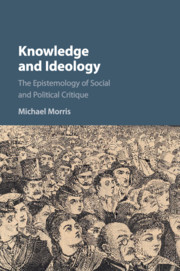Part III - A Marxist Theory of Knowledge
Published online by Cambridge University Press: 17 November 2016
Summary
In Part I, we considered how the proliferation of merely functional forms of ideology critique, along with other recent trends, has emphasized the dramatic divergence between our ideal epistemic norms and the social realities of human thought. By unmasking the dubious social origins and functions of prominent beliefs, customs, and social roles, the functional critique of ideology has often initially served liberational aims. However, as this critical technique proliferated and became a common reflex, it focused our collective attention upon the noncognitive dimensions of all thought, and it revealed the externally imposed and socially problematic nature of the varied customs and social roles that form our identities. The apparently justified cynicism that emerges from this increasing social awareness has undermined the normative basis for liberational politics and our confidence in rational discourse. It disintegrates and dissolves the subject of liberation. It undermines the intrinsic value of public enlightenment. It renders tenuous our ideals of self-determination. And it encourages the temptation to treat people and their convictions as domains of instrumental control.
In Part II, we then reconstructed a partial history of functional ideology critique. This history emphasized the non-Marxist interests and texts that informed this tradition, and it demonstrated the links between strictly functional critiques of ideology and the glorification of violence. This link serves to undermine the more sanguine attitudes of postmodern radicalism, with its conviction that endless debunking, unmasking, and deconstructing must naturally promote tolerance and militate against aggression. While the postmodern stance might accept the permanent humiliation of traditional epistemological aspirations, our discussions of Rousseau, Stirner, and others suggest that we must find a way to rejoin the aspirations of traditional epistemology, albeit in some new, inherently social, and suitably humbled form.
Additionally, our treatment of Rousseau and Stirner provides an exploratory application of the socioanalytic technique that characterizes the neo-Hegelian variation of epistemic ideology critique. This theory of epistemic ideology critique assumes that cognitive reflection generally emerges from the partial frustration of a social practice. In the face of complex obstacles that can often only be surmounted through dramatic collective action, this theory further assumes that the purposes, materials, and contexts of a given social practice tend to enter consciousness in a sublimated form.
- Type
- Chapter
- Information
- Knowledge and IdeologyThe Epistemology of Social and Political Critique, pp. 179 - 182Publisher: Cambridge University PressPrint publication year: 2016

